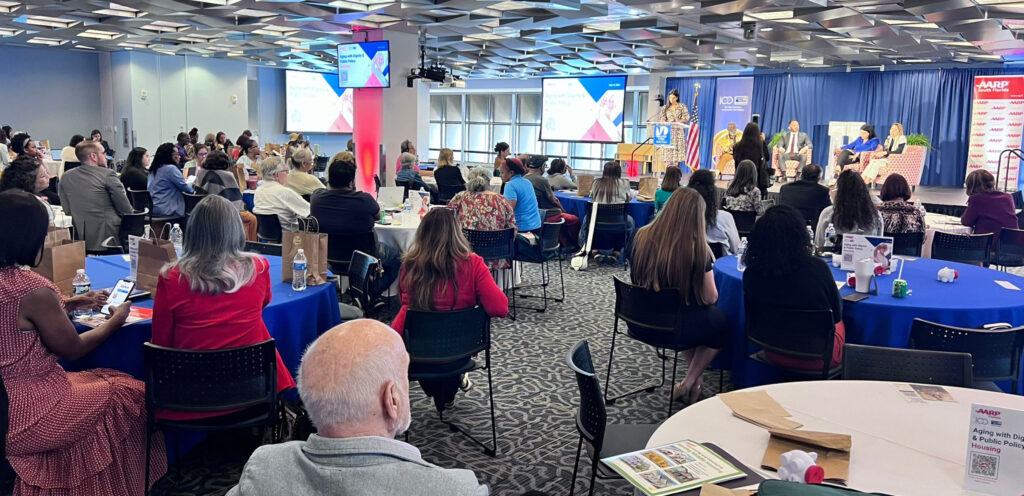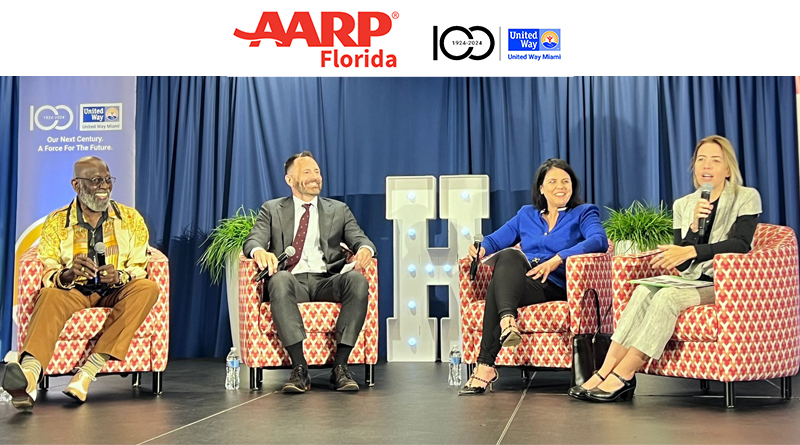United Way Miami And Aarp Florida Present: Aging With Dignity & Public Policy
AARP Florida, together with United Way Miami, joined experts on aging issues and elected officials from South Florida at the north campus of Miami-Dade College on Wednesday, May 15th, to discuss the problems faced by older adults and how laws, regulations, and public policies can help our community age with grace and respect.
Expert panelists, including Florida State Senators Ana Maria Rodriguez and Alexis Calatayud, and Miami-Dade County Commissioner Raquel Regalado, focused on allowing older adults to maintain their independence as they age by addressing challenges in housing and finding solutions for affordable housing in new and innovative ways. More than 100 people were in attendance.
Some of the conversations focused on accessible dwelling units, which have become increasingly popular in the area.
Below is a summary of everything discussed during the forum:
Housing Challenges in Miami-Dade:
A large proportion of full-time and part-time workers work hourly, which means they work paycheck to paycheck and struggle to make ends meet. We estimate that about 500,000 households in Miami-Dade County are within this threshold, where they’re earning too much to qualify for financial assistance but not enough to cover their basic needs.
United Way primarily focuses on these populations, offering a variety of initiatives, from early education to services for older adults.
“Advocacy is one of United Way Miami’s core values. Through our collaborative efforts and partnerships, we have positively impacted thousands of older adults by facilitating their access to essential resources, such as in-home personal care, fitness programs, and nutritious meals. Our mission strongly aligns with that of AARP, and we are delighted to contribute to raising awareness about the significance of meeting the needs of our older adult community,” said Symeria Hudson, president and CEO of United Way Miami.
 Aging Population:
Aging Population:
It is projected that by 2034, there will be more people over 65 than under 18 in the United States. Traditionally, communities have been built with a focus on younger populations, often neglecting the needs of older adults. This demographic shift demands a reevaluation of planning and resource allocation to ensure the needs of older adults are adequately met.
Affordable and Accessible Housing:
A critical issue is the lack of affordable and accessible housing. Less than 1% of homes are equipped with necessary features for older adults, such as step-free entrances, accessible switches, and ground-floor bathrooms and bedrooms. Additionally, more than 11 million people over 65 spend more than 30% of their income on housing, leaving them with little savings for emergencies or health issues. This dual challenge of high housing costs and inadequate infrastructure worsens the situation for older adults.
Age-Friendly Communities:
Inclusive and age-friendly communities are essential. These communities must offer housing options that meet the needs of people of all ages, incomes, and backgrounds. To achieve this, various issues must be addressed, from accessibility to affordability. AARP has been dedicated to creating inclusive communities that support both younger and older residents, ensuring everyone has access to the resources and services they need.
Assessment Tools and Initiatives in Florida:
The AARP Livability Index developed nearly a decade ago, is a valuable tool for assessing how well a community supports its residents in critical categories: housing, neighborhood, transportation, environment, health, engagement, and opportunity.
This provides information to help residents and policymakers make informed decisions about community development and investments.
In Florida, affordability issues are particularly acute. Initiatives like zoning rule changes in St. Petersburg and the approval of Additional Dwelling Units (ADUs) in several counties aim to increase affordable housing options. Additionally, cities like Tampa are doubling funds for subsidized housing programs to improve affordability citywide.
Continuity of AARP’s Commitment:
AARP remains committed to improving housing outcomes nationwide, providing resources to community leaders and residents to address these challenges. Through tools like the Livability Index and collaborations with industry partners, AARP works to create more inclusive and sustainable communities for people of all ages.
“AARP Florida is proud to join United Way Miami to help inform older adults in the community on how public policies can enhance and protect their quality of life as they age,” says AARP Florida Director Jeff Johnson. “AARP will continue to fight for necessary protections for our most vulnerable population.”
The future is unpredictable! To face these challenges, a comprehensive approach is required. This involves a collaborative effort between government, industry, and individuals to implement effective solutions. Advocacy for changes in zoning laws and regulations, as well as the implementation of programs that support the creation of diverse housing options, is necessary. Engaging builders, remodelers, designers, and other industry professionals in creating housing options that meet the needs of all individuals is also crucial.
It is essential for individuals to consider their future housing needs and plan accordingly, being proactive in understanding potential challenges and making long-term beneficial decisions.

